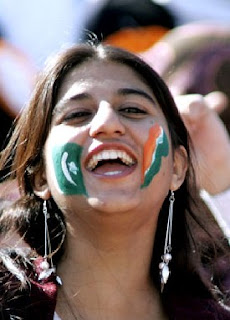 |
| पाकिस्तान के राष्ट्रपति भवन में बैठक |
पाकिस्तान में पिछले कुछ दिन से न्यायपालिका और सरकार के बीच तनाव चल रहा है। पिछले हफ्ते गुरुवार की रात सुप्रीम कोर्ट के चीफ जस्टिस इफ्तिखार चौधरी ने अचानक सभी जजों की एक बैठक बुलाई। इसमें अंदेशा ज़ाहिर किया गया कि सरकार जजों की बर्खास्तगी वापस लेने के आदेश को खत्म करने जा रही है। ऐसा गलत होगा। दरअसल दिन में टीवी चैनलों पर यह खबर चल रही थी कि सरकार जजों की बहाली का आदेश वापस लेने जा रही है।
चीफ जस्टिस की टिप्पणियाँ अखबारों में छपने के बाद सूचना मंत्री क़मर ज़मां कैड़ा और कानून मंत्री बाबर आवान ने अगले रोज़ स्पष्ट किया कि सरकार की ऐसी मंशा नहीं है। कानून मंत्री ने थोड़ा कड़ाई से कहा कि सरकार को गिराने की कोशिशें की जा रहीं हैं। सामने से सीधी-सादी नज़र आ रहीं चीज़ों के पीछे कुछ गहरी बातें दिखाई पड़ रही हैं। राष्ट्रपति ज़रदारी को हटाने की मुहिम चलरही है। इसमें अदालत भी सक्रिय है।
चीफ जस्टिस इफ्तिकार चौधरी इन दिनों जनता के छोटे-छोटे मामलों पर सुनवाई करके कभी किसी पुलिस अफसर की तो कभी किसी मंत्री की घिसाई कर रहे हैं। इससे वे लोकप्रिय भी हुए हैं। यह भी सच है कि उनकी बहाली मुस्लिम लीग(नवाज़) की अगुवाई में चले आंदोलन के बाद हुई थी।
पाकिस्तान को लोकतंत्र वैसा ही नहीं है जैसा भारत में है। वहाँ अभी राजनैतिक और संवैधानिक संस्थाएं जन्म ले रहीं हैं। राजनीति वहाँ बदनाम शब्द है, भारत की तरह। सेना की वहाँ राजनैतिक भूमिका है। चीफ जस्टिस की टिप्पणी के बाद राष्ट्रपति भवन में जो बैठक हुई उसमें सेनाध्यक्ष अशफाक परवेज़ कियानी भी शामिल थे। सेना की इस भूमिका पर हमें आश्चर्य हो सकता है, पर पाकिस्तान पहला देश नहीं है, जहाँ राजनीति में सेना की भूमिका है। इंडोनेशिया और बर्मा हमारे पड़ोसी हैं। वहाँ भी सेना की भूमिका है।
आसिफ अली ज़रदारी पर भ्रष्टाचार के अनेक मामले थे। परवेज़ मुशर्रफ ने उन मामलों को एक आदेश जारी कर खत्म कर दिया। इधर सुप्रीम कोर्ट ने उस आदेश को खत्म कर दिया। अब ज़रदारी की गर्दन नापने की कोशिश हो रही है। राष्ट्रपति होने के नाते अभी यह सम्भव नहीं है। किसी न किसी वजह से ऐसा माना जा रहा है कि इफ्तिखार चौधरी न्यायिक सक्रियता को या तो सीमा से ज्यादा खींच रहे हैं या राजनीति में शामिल हो रहे हैं।
आज यानी रविवार को प्रधानमंत्री सैयद युसुफ रज़ा गिलानी देश को संबोधित करने जा रहे हैं। पिछले कुछ दिनों में कई बातें हुईं हैं। एक अंदेशा है कि सेना कहीं सत्ता न संभाल ले। उधर परवेज़ मुशर्रफ ने राजनीति में आने की घोषणा कर दी है। वे अभी विदेश में हैं। इफ्तिखार चौधरी उन्हें अपना दुश्मन मानते हैं। वहाँ की अदालतों में भी भ्रष्टाचार है। कट्टरपंथी लोग लोकप्रिय हैं। जिन्हें हम आतंकवादी कहते हैं, पाकिस्तान में वे सम्मानित राष्ट्रवादी हैं। उन्हें अदालतों से भी मदद मिलती है। हफीज़ सईद के मामले में आप देख चुके हैं। उम्मीद करनी चाहिए कि प्रधानमंत्री के राष्ट्रीय प्रसारण के बाद मामला सुलट जाएगा, पर हालात को देते हुए लगता है कि कोई नया मसला उभरेगा। ज़रूरत इस बात की है कि यह सरकार अपना कार्यकाल पूरा करे और उसके बाद चुनाव हों और नई सरकार बने। लोकतंत्र की सारी प्रक्रियाएं कई बार सम्पन्न होती हैं तभी वह शक्ल लेता है। बहरहाल ताज़ा मामले पर डॉन का आज का सम्पादकीय पढ़ेः-

|
|
 |
|
BEFUDDLING, bemusing, bizarre — however you described it, it may still not do full justice to what transpired between Thursday evening and Friday afternoon. An alleged ‘plot’ by the government to send the Supreme Court packing was breathlessly released into the 24hour TV-news cycle Thursday evening. The report rapidly metastasised and within hours the SC swung into late-night action and announced a full-court hearing for Friday morning. The government has now been ordered to conduct an inquiry into the circumstances surrounding the news reports and to affix responsibility — the court having made clear it believes there is some truth to the allegations.
Three players are involved in this sordid tale of rumour and intrigue, and all need to reflect on their behaviour. First, the media. That there are tensions between the government and the superior judiciary is undeniable, and if a news organisation has a story of public interest regarding the perceived judiciary-executive ‘clash’ then it has a right, even a duty, to broadcast or publish the story. But there are journalistic responsibilities, too, and those include needing to be reasonably sure of the veracity of allegations that are to be made public. And when the allegations have the potential to irreparably rupture relations between two institutions of the state, the journalistic re sponsibilities increase manifold. Were the appropriate and necessary steps taken to ensure the reports aired on Thursday night reflected the factual position? Was the manner of the coverage in keeping with the ethics of a profession that is supposed to strive to report the news, not make the news?
Next, the judiciary. To be sure, given recent history and the personal price many of the judges of the SC have paid to create an independent judiciary, to some extent it is understandable the justices may feel a heightened sense of pressure and threat to their position. However, a judiciary is supposed to add to the dignity and poise of the state, not add to a sense of national political crisis. Setting aside the matter of intention for a moment, it seems fairly obvious the chances of a government-sponsored move to disband the entire SC succeeding are quite remote. So middle-of-thenight meetings and fullcourt emergency benches are perhaps unnecessary, there being less disruptive ways and means available to the court to ensure its independence.
Finally, the government. Would it harm the government to once in a while take the high road? With emotions running high in the SC yesterday, the responsible, stability-enhancing thing to have done was reassure the court. Alas, common sense appears to be in short supply in Islamabad. |
|
|












